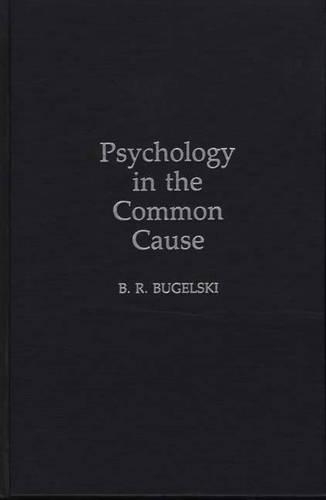
Psychology in the Common Cause
(Hardback)
Publishing Details
Psychology in the Common Cause
By (Author) B. R. Bugelski
Bloomsbury Publishing PLC
Praeger Publishers Inc
10th January 1989
United States
Classifications
Tertiary Education
Non Fiction
302
Physical Properties
Hardback
228
Description
In Psychology in the Common Cause, Bugelski examines the problems we face by living in groups--war, poverty, inflation, unemployment--and asks whether psychology has anything to offer in connection with such problems. Writing from a unique behavioral perspective, Bugelski poses profound questions about current psychological efforts to contribute to human affairs, adding a new dimension to the ongoing debate about psychology's ultimate potential to ameliorate some of the more intractable problems of everyday life. His arguments, although supported by empirical research and theory, are couched in terms accessible to both the interested general reader and the undergraduate who seeks new insights into psychological approaches to contemporary life. Focusing on four particular problem areas--population problems, and those involving law, business, and education --Bugelski argues that, in many cases, psychological approaches aimed at producing a better world suffer from serious shortcoming. Indeed, Bugelski contends, there are some areas--economic behavior, for example--in which no meaningful applications of psychology are possible at all, pointing to the need for different approaches. For those areas in which psychology can make a contribution, Bugelski highlights behavioral principles which can help people live with, even solve, some of the problems inevitable when people live in groups. In his conclusion, Bugelski addresses the lessons learned and the issues raised in applying psychology to the common cause.
Reviews
An authoritative interpretation of psychological principles applied to contemporary problems. The author prepares for the analysis with a concise review of techniques for the analysis of controversy. Human problems are categorized in terms of population, law, business, and education. Since it is impossible to classify all debates facing humankind, methods are described which the reader may apply. Whereas other scholars have focused on the environment or work, Bugelski concentrates on interrelated attitudinal changes since solutions often involve personal gains with loss for others. Through repeated emphasis on individual differences and determinism, the author establishes the groundwork for greater tolerance. Recommended for general readers through graduate students.-Choice
"An authoritative interpretation of psychological principles applied to contemporary problems. The author prepares for the analysis with a concise review of techniques for the analysis of controversy. Human problems are categorized in terms of population, law, business, and education. Since it is impossible to classify all debates facing humankind, methods are described which the reader may apply. Whereas other scholars have focused on the environment or work, Bugelski concentrates on interrelated attitudinal changes since solutions often involve personal gains with loss for others. Through repeated emphasis on individual differences and determinism, the author establishes the groundwork for greater tolerance. Recommended for general readers through graduate students."-Choice
Author Bio
B. R. BUGELSKI is a Distinguished Professor Emeritus at the State University of New York at Buffalo. He has taught college students for 40 years and has published six books and more than 50 experimental research papers
